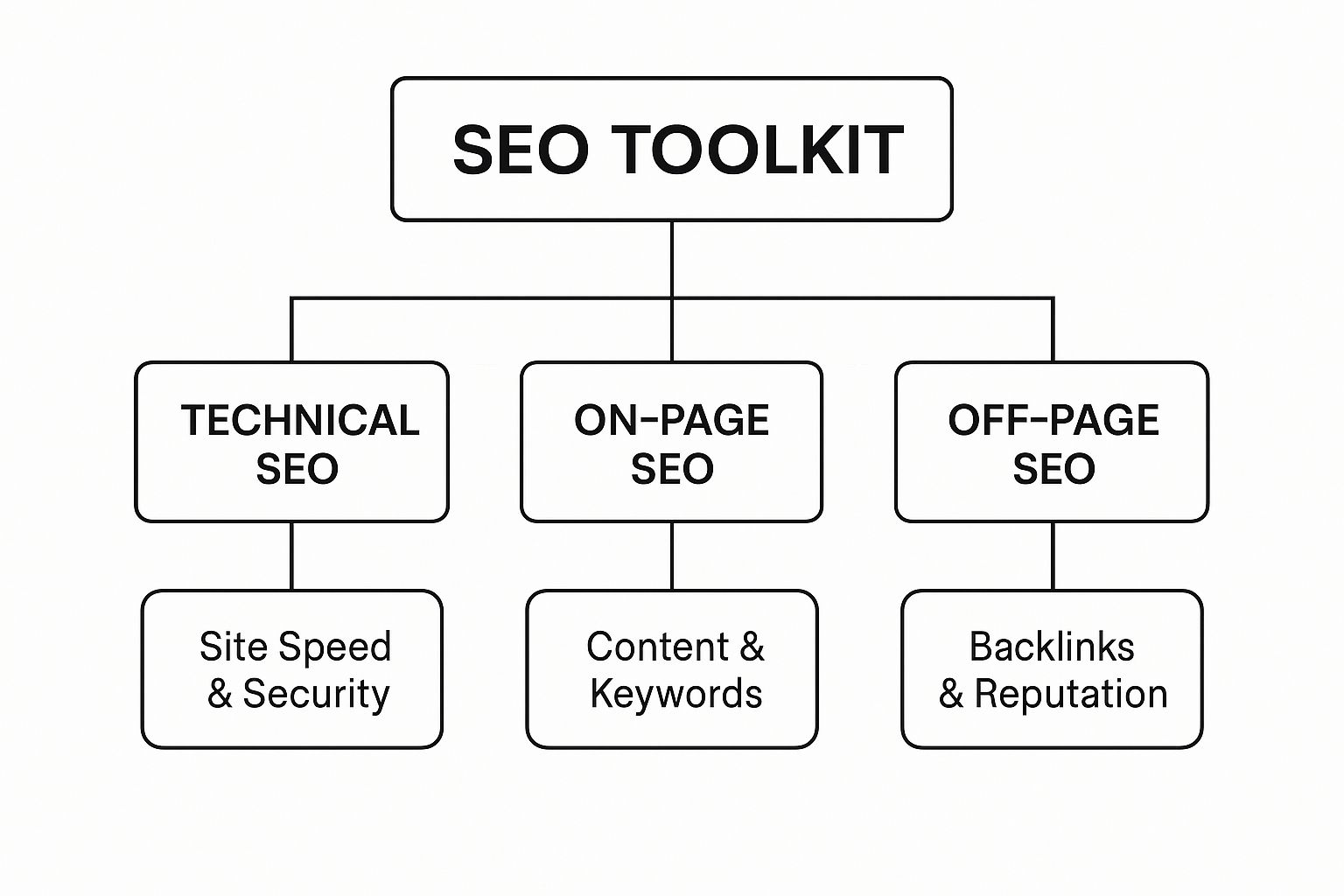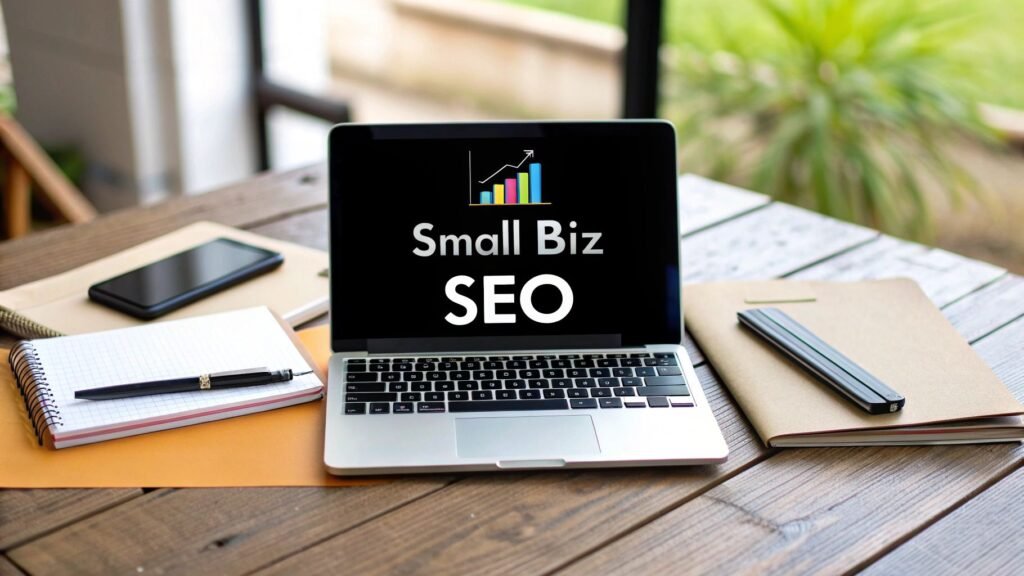At its core, search engine optimisation (or SEO) is all about making your business more visible on search engines like Google. It’s a collection of strategies designed to help potential customers find you at the exact moment they’re searching for the products or services you offer.
The end game? To drive more of the right kind of traffic to your website—people who are actively looking to buy—which naturally leads to more enquiries and sales.
Why SEO Is Your Unseen Salesperson

Think of Google as the busiest high street in the world. When a customer walks down this digital street looking for exactly what you sell, SEO is what makes your shopfront the one with the bright, welcoming sign they can't help but notice first. A 2023 study by Backlinko confirmed that the #1 result in Google's organic search results has an average click-through rate (CTR) of 27.6%. That's a massive competitive advantage.
But it’s not just about being seen; it’s about being seen at the perfect time. Good SEO acts like your best salesperson, working 24/7 to connect you with customers precisely when they’re ready to pull out their wallets.
A Direct Investment in Growth
For Australian businesses, this digital "high street" is getting more crowded every day. The local SEO industry is on track to hit a staggering $1.5 billion in 2025. Reflecting this, small businesses are now putting an average of $1,350 per month into their SEO efforts—a huge jump from just a few years ago.
This shift shows that savvy business owners no longer see SEO as just another expense. They see it for what it is: a critical investment in their ability to compete and grow. If you're interested in the numbers, you can find more insights about the state of SEO in Australia.
This strategic spending pays off in a few key ways:
- Sustainable Traffic: Unlike paid ads that vanish the moment you stop paying, a well-ranked page can be a source of new customers for years to come.
- Increased Credibility: Let's be honest, people trust organic search results far more than they trust paid ads. Ranking well naturally boosts your brand’s authority and makes you the trusted choice.
- Higher Conversion Rates: The traffic that comes from SEO is incredibly qualified. These aren't just random visitors; they're people who went looking for a solution that you provide.
"Investing in SEO is a direct investment in sustainable growth, lead generation, and building a trusted brand. It's about turning searches into loyal customers."
Ultimately, effective SEO transforms your website from a static online brochure into a powerful, lead-generating machine. It works tirelessly behind the scenes, ensuring that when someone in your area needs your expertise, your business is the first one they find.
Understanding Your SEO Toolkit
Think about building a powerful online presence like you would a house. You need a solid, reliable foundation to hold everything up, rooms that are well-designed and easy for people to move through, and a stellar reputation in the neighbourhood. The best SEO services for a small business will build all three of these for you, masterfully.
This simple analogy is a great way to demystify the core pillars of any effective SEO strategy. Each piece plays a distinct, critical role. If you neglect one, the whole structure can start to feel a bit wobbly over time. Getting your head around how they all work together is the first step to making a smart investment.
The Foundation: Technical SEO
Before you can even think about decorating, you need to be sure the foundations are flawless. Technical SEO is exactly that—it’s the structural integrity of your website. It’s all about optimising the backend so that search engines can crawl, understand, and index your site without hitting any snags.
This covers critical elements like site speed, mobile-friendliness, and security. A slow-loading or confusing website is a huge red flag for Google, much like a cracked foundation would be for a home inspector. In fact, just a one-second delay in your page load time can lead to a 7% drop in conversions.
The Interior Design: On-Page SEO
Once your foundation is solid, it's time to work on the interior. On-Page SEO is everything a visitor (and Google) sees on your actual pages. This is your content, the keywords you’re targeting, your headings, and the overall experience for the user.
This infographic breaks down the three core components of a complete SEO toolkit.

As you can see, each pillar supports the overall structure, making sure your digital presence is both strong and visible.
Getting your on-page optimisation right ensures your website isn't just functional, but also persuasive and genuinely helpful. It tells search engines exactly what each page is about, making it far easier for them to rank you for relevant customer searches. For a deep dive on this, our comprehensive on-page SEO checklist is an excellent place to start.
A journalist once asked me for a quick, Reddit-worthy take on what matters most in SEO. I told them: "Technical SEO gets you in the race. Off-Page SEO gets you noticed by the judges. But On-Page SEO is what actually wins you the medal. It's the part your customers actually see and experience."
The Neighbourhood Reputation: Off-Page SEO
Finally, even the most beautifully designed house needs a good reputation in the community to truly feel like a home. Off-Page SEO is your digital reputation, built primarily through backlinks—which are essentially votes of confidence from other websites.
When a reputable, relevant website links back to yours, it signals to Google that you are a trustworthy authority in your field. It's the digital equivalent of a well-respected neighbour recommending your business to newcomers. These external signals are absolutely crucial for building long-term authority and climbing the search rankings.
These three pillars—Technical, On-Page, and Off-Page SEO—aren't separate services. They're interconnected parts of a single, powerful strategy. A successful campaign ensures your foundation is strong, your content is compelling, and your reputation is undeniable.
Winning the Neighbourhood with Local SEO

For most small businesses, your most valuable customer isn't halfway across the country—they're just around the corner, searching for you right now. This is where Local SEO becomes your secret weapon. It’s a strategy laser-focused on capturing those high-intent "near me" searches that drive real foot traffic and local sales. According to Google's own data, 76% of people who search for something nearby on their smartphone visit a related business within a day.
Think of it like this: general SEO is about competing on a national or even global stage. Local SEO is about becoming the undisputed champion of your own neighbourhood. It ensures that when someone nearby needs what you offer, your business is the first and best answer Google gives them.
Your Digital Storefront: The Google Business Profile
Your Google Business Profile (GBP) is far more than just a listing; it's your digital storefront. For many local customers, it's the very first interaction they'll have with your brand, often before they even click through to your website. A well-cared-for profile is the difference between getting noticed and getting completely overlooked.
To make your profile pop on Google Maps and in local search results, you need to treat it with the same attention you give your physical premises. This means:
- Showcasing Your Work: Regularly upload high-quality photos of your projects, your team, and your location. Give people a genuine feel for your business.
- Listing Your Services: Clearly detail every single service you offer. This helps Google match you with super-specific searches like "emergency plumber in Brisbane" instead of just "plumber."
- Engaging with Customers: Answer questions posted on your profile promptly. And respond to every single review—the good and the bad.
The Power of Consistency and Reviews
Beyond your GBP, a massive local ranking factor is consistency. Your Name, Address, and Phone number (NAP) must be identical everywhere it appears online, from local directories to your social media pages. Any inconsistencies, even small ones, create confusion for search engines and can drag your visibility down.
Just as crucial is building a steady stream of positive customer reviews. An incredible nearly 90% of consumers trust online reviews as much as a personal recommendation from a friend. Reviews are powerful social proof that builds trust not only with potential customers but also with Google itself, signalling that you're a legitimate, valued local business. For more actionable steps, check out our deep dive into local SEO for small business.
Local SEO is about owning your backyard. It's making sure that when someone in your postcode searches for what you do, you're not just an option—you're the only option they seriously consider.
This is a space that's constantly changing, too. For instance, in Australia, around 33% of people now use voice search daily, often for local queries like "find a cafe near me that's open now." These searches are longer and more conversational, which means your website content needs to be optimised to provide direct answers to specific questions. This focus on local authority, trust, and real-world user experience is how you win your local market.
Creating Content That Connects and Converts

Powerful SEO is fuelled by one thing above all else: content that genuinely helps your customers. This isn't about churning out generic blog posts stuffed with keywords. It's about becoming the most helpful, authoritative, and trusted answer to the questions your ideal customers are typing into Google every single day.
When you consistently solve their problems, you earn their trust. More importantly for your rankings, you earn Google’s trust too. This process builds what we call topical authority, signalling to search engines that you are the go-to expert in your field.
A Practical Content Framework
A powerful content strategy for a small business doesn’t need to be complicated. It just needs to cover the entire customer journey, from the moment they realise they have a problem to the moment they're ready to make a decision. The best SEO services for a small business will help you build out three core types of content that work together to attract traffic and turn it into leads.
This framework makes sure you have a page ready to meet your customer's needs, no matter where they are in their buying process:
- Essential Service Pages: Think of these as your digital sales pitches. Each page needs to focus on a single service you offer, spelling out the benefits, answering common questions, and making it dead simple for a visitor to take the next step.
- Insightful Blog Articles: This is where you build trust and authority. These articles answer the "how," "what," and "why" questions your customers have long before they're ready to buy, positioning you as a helpful expert, not just a salesperson.
- Local Landing Pages: For any business serving specific areas, these pages are non-negotiable. A dedicated page for "Plumbing Services in Brisbane" will always be more effective at capturing local searches than a generic, one-size-fits-all service page.
Journalists often ask for the single biggest content mistake small businesses make. My answer is always the same: they talk about themselves, not their customers' problems. The best content marketing is simply documenting the answers to the questions your customers ask you every single day.
Finding Endless Content Ideas
Your customers are handing you content ideas on a silver platter, probably without you even realising it. Every time a client asks a question on the phone, in an email, or in person, they are giving you a perfect topic for a blog post that you know your audience is searching for.
Start by making a list of the top 10-15 questions you hear most often. Those are your first, most valuable pieces of content. For example, a roofer might constantly get asked, "How do I know if my roof needs replacing?" Answering that question thoroughly in an article is a guaranteed way to attract highly qualified local traffic.
By focusing on being genuinely helpful, you create content that doesn't just rank—it builds trust and converts visitors into paying customers.
How to Hire an SEO Partner and Avoid Red Flags
Choosing an SEO provider for your small business is a huge decision. Get it right, and you’ve found your most valuable partner for growth. Get it wrong, and you could waste thousands of dollars and set your progress back by months.
The best way to protect your investment is to know what you’re looking for. Too many business owners get burned by flashy promises that never quite materialise. Learning how to spot the warning signs of a bad operator—and the positive signals of a genuine expert—is half the battle.
Common SEO Red Flags to Watch For
Some providers prey on a business owner's lack of technical knowledge. They use impressive-sounding jargon and guarantees that are simply impossible to keep. Be extremely wary if you come across any of these during your search.
- Guaranteed #1 Rankings: This is the oldest trick in the book. No one can guarantee a specific ranking on Google. The algorithm has hundreds of factors and is constantly changing. A true professional talks about sustainable growth, traffic quality, and leads—not unobtainable guarantees.
- A "Secret Sauce" Methodology: Transparency is everything in SEO. If a provider is cagey about their process and calls it a “proprietary” or “secret” method, run. It's often code for using outdated or harmful "black-hat" techniques that could get your website penalised by Google.
- Obsession with Vanity Metrics: A laser focus on things like keyword rankings or impressions, without connecting them to actual business outcomes like phone calls or sales, is a massive red flag. Who cares about traffic if it doesn't convert into paying customers?
A journalist once asked for a "Reddit-worthy" tip on spotting a bad SEO. I told them: "If they sound more like a used car salesman than a business strategist, run. Good SEO is about revenue, not just rankings."
Green Flags of a Trustworthy SEO Partner
On the flip side, a high-quality SEO partner will act like a true consultant. From the very first conversation, they'll be focused on your business goals. Their approach will be strategic, open, and grounded in realistic outcomes.
Look for these positive signs:
- They Ask About Your Business Goals: Their first questions should be about your revenue targets, your most profitable services, and your ideal customer—not just the keywords you want to rank for. A great SEO strategy is built around your business, not just a search engine.
- Transparent Reporting: They should provide clear, easy-to-understand reports that show the work they’ve done. More importantly, those reports should show the impact it’s having on your traffic, leads, and bottom line.
- Realistic Case Studies: A good partner can show you examples of similar businesses they've helped. They won’t just show you a graph going up; they’ll explain the challenges, the strategy they used, and the tangible business results they delivered over a realistic timeframe.
Key Questions to Ask Potential Providers
To cut through the sales pitch and find a true partner, you need to ask the right questions. This helps you get a feel for their process, their expertise, and how they truly define success. Before hiring a search engine optimisation SEO specialist, make sure you ask them these questions:
- How will you tie your SEO efforts directly to our business goals, such as generating more qualified leads?
- Can you walk me through a case study of a similar business you've worked with?
- What does your communication and reporting process look like, and how often will we connect?
- How do you stay up-to-date with Google's algorithm changes?
Measuring SEO Success Beyond Rankings
So, how do you actually know if your investment in SEO services is paying off? It feels great to see your website climb the rankings, but that’s just a vanity metric if it doesn't translate into real business. True success is measured by what impacts your bottom line.
A good SEO partner cuts through the noise and demystifies reporting by focusing on tangible results. Instead of just showing you a list of keyword positions, they’ll highlight the meaningful Key Performance Indicators (KPIs) that signal real, sustainable growth. It’s all about tracking the data that actually matters to your operations.
Key Performance Indicators That Matter
The entire conversation needs to shift from "Where do we rank?" to "How is SEO actually growing the business?" The most valuable reports will show clear, undeniable progress in these areas:
- Growth in Qualified Organic Traffic: An increase in visitors coming from non-branded, commercially-focused search terms shows you're reaching new customers who are ready to buy, not just people who already know your name.
- Increase in Conversions: This is the ultimate measure of success. Tracking the rise in phone calls, contact form submissions, or online sales that came directly from organic search provides a clear return on investment. A 19% increase in organic conversions is a solid benchmark for a successful campaign.
- Higher Engagement Rates: Metrics like a lower bounce rate and longer time spent on your pages are crucial. They tell you that the traffic you're getting is relevant and genuinely interested in what you have to offer.
By focusing on conversions over rankings, you can have productive, goal-oriented conversations with your SEO provider and understand the real-world value they are delivering to your business.
Your Small Business SEO Questions Answered
Diving into SEO can feel like learning a new language. You’ve probably got a lot of questions. Here, we'll tackle the most common ones we hear from small business owners, giving you straight, no-fluff answers to help you get your bearings.
How Long Does SEO Take to Show Results?
Let’s be clear: SEO is a long game, not an overnight fix. While you might spot some early positive signs in keyword rankings within three to four months, the real, business-changing results—like a steady stream of leads and a noticeable uptick in sales—typically take 6 to 12 months to properly kick in.
This gives enough time for all the moving parts, like technical fixes, content development, and building your site's authority, to really gain traction and deliver. Be extremely wary of anyone promising instant success. Real, sustainable growth is built on patience and a consistent, smart strategy.
Can I Do My Own SEO or Should I Hire an Expert?
You can absolutely get the ball rolling yourself. Foundational tasks like managing your Google Business Profile and asking customers for reviews are great places to start.
However, a full-blown SEO campaign—the kind that involves technical site audits, digging into what your competitors are doing, and building strategic links—is a full-time job in itself. For most business owners, hiring a professional delivers a much better return. It frees you up to do what you do best: run your business, while a dedicated expert focuses on a proven strategy to grow it.
What Is a Realistic SEO Budget in Australia?
Your investment in SEO will depend on how competitive your industry is and what you’re hoping to achieve. For a quality, comprehensive seo services for small business package in Australia, you can expect a monthly retainer to be somewhere in the range of $1,000 to $3,000+.
It’s important to see this as an investment, not just another monthly bill. When done right, SEO builds a powerful, long-term asset that keeps generating qualified leads for years. It often becomes a business’s most profitable and reliable marketing channel.
Ready to build an SEO strategy that drives real business growth? At The Brand Express, we partner with businesses like yours to turn search visibility into measurable commercial impact. Discover our performance-led SEO services.
